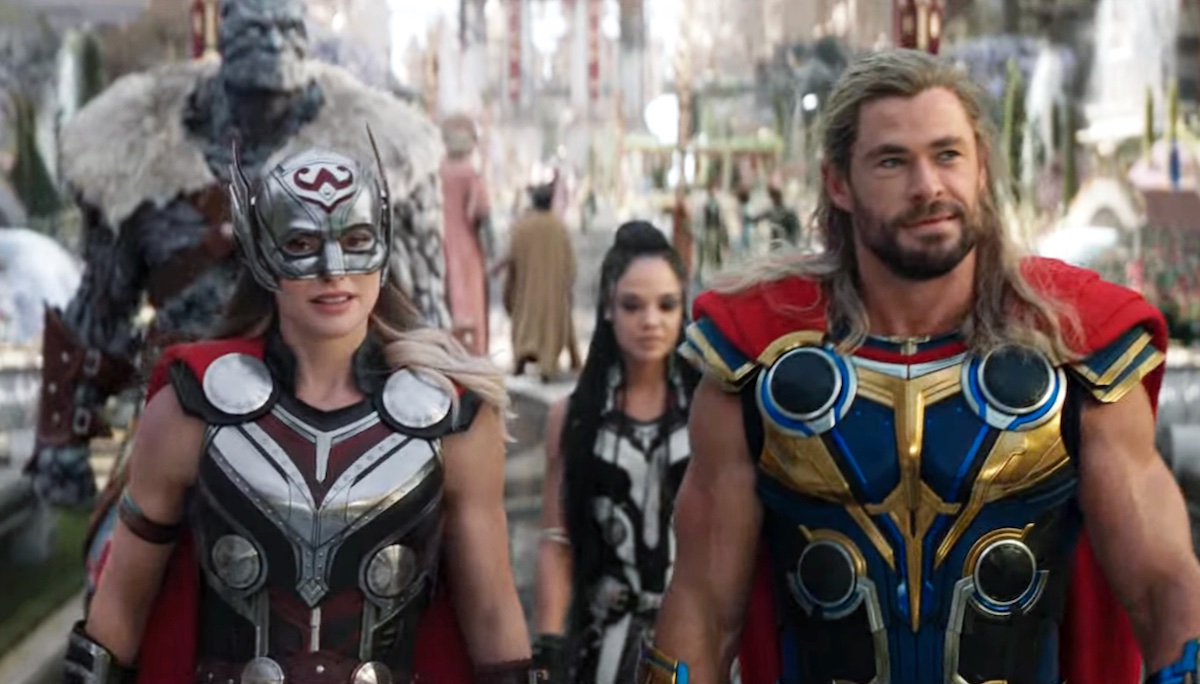‘Thor: Love and Thunder’s’ Highs and Lows Are Part of Marvel’s Larger Thor Problem

As someone who has been forced, through their profession, to keep up with comic book movies, it has been fascinating watching Phase 4 of the Marvel Cinematic Universe unfold.
Spoilers for Thor: Love and Thunder.
Phase 4 is the first that isn’t blatantly moving towards a singular big bad or overarching storyline. It is also the most diverse in terms of both who are the creators working on the movies and TV series and who is getting to be the heroes—and this is precisely the time when the Marvel fatigue is setting in.
In many ways, the MCU had the benefit of low expectations. When Iron Man first came out, no one could have thought this would be a natural conclusion. I mean, a good chunk of the people responsible for the MCU also worked on the much maligned 2003 Daredevil movie. In the beginning, the freak-show effect was that the franchise managed to be good “in spite” of being comic book films. Now, that is old hat. Our expectations have shifted. We now want these movies to be hyper-polished, deep films that continue to build.
Part of it is the fact that Marvel and Disney won’t take a break and stop delivering endless content. Part is that Disney, as a media company is ultimately too powerful and controls too much media. But, in my opinion, part of the issue is that the MCU was attempting to “elevate” comic book movies—to make them “for everyone,” not just accessible but destigmatized in the minds of audiences who only turn out for the gritty Batman films.
In doing that, you downplay and erase all the things that make comic book movies interesting in the process. Especially when you lack half the IP of the comic book universe you’re adapting, you need to … well, adapt and are forced to do things like give Tony Stark storylines that have nothing to do with him. Creative and interesting stories don’t matter because they must fit into the interconnected universe.
Iron Man 3 was an excellent Christmas comedy that touched on Tony’s PTSD, but because it followed Avengers, everyone wanted it to fit into that. Then, Tony’s progress in that film was instantly erased because the larger storyline needed Iron Man back for Civil War.
Thor has suffered from this immensely. To a degree, all the Avengers have characterization issues in their collaborative films versus standalone features, but Thor got screwed over each time, from “he’s adopted” in the first one to getting stuck in a tub for most of Age of Ultron, being fully absent in Civil War, and then … there is Infinity War.
Right after Ragnarok, a film that actually perfectly used Chris Hemsworth’s comedic chops, leaned into the queer agenda and saw Thor fully ascend to be king and reunite with his brother, Infinity War killed off his entire supporting cast, save Valkyrie. The majority were killed offscreen.
Thor is so powerful that his presence completely shifts the tide of a battle, so his conflict can’t be about strength; it has to be about who he is as a person. When we first met Thor, he was arrogant and vain, only wanting war and to be king of Asgard. His entire story has been about humbling himself and loving someone beyond himself. That has led to him giving up being king, which culminates in him choosing not to fight Gorr and to, instead, be with Jane as she dies.
For me, that is a natural character arc for Thor and shows how he has become someone who cares about the collective community and people other than himself. The problem is that Thor has been underwritten, and his storyline has had to maneuver around everyone else’s story. Imagine what could have happened in Loki weren’t killed off? If most of Asgard weren’t killed off? Choices that were not made by Ragnarok and Love and Thunder director Taika Waiti, but ones he inherited.
Thor is a character who has been adrift at times and has not been helped by the lack of a singular journey for him, as a character, at this point. I think Thor: Love and Thunder is fun, silly, and reminds me of why I enjoyed The Mummy and The Mummy Returns (neither of which are critical darlings), but the issue that exists is forgetting that these need to be contained stories with smaller endgames. We don’t need a larger big bad, but we need more of a purpose, for the characters themselves, for these movies to keep going.
(featured image: Marvel Studios)
Have a tip we should know? tips@themarysue.com